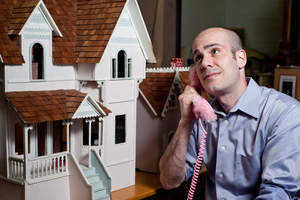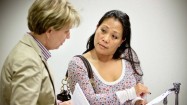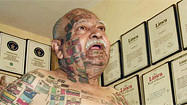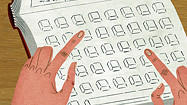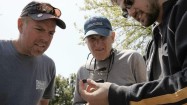- 1
- 2
- next
- | single page
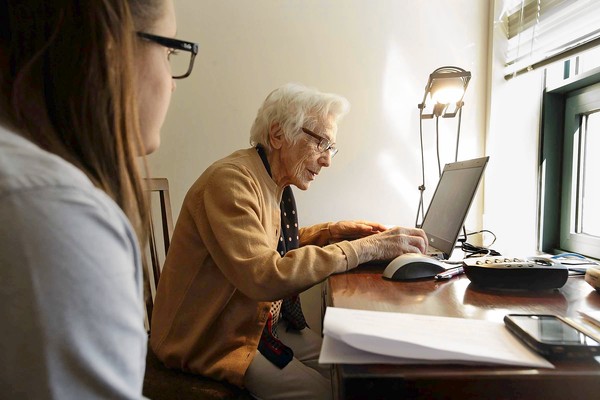
Pace University student Alice Simmons tutors Pauline Lockman, 91, on how to use her computer in her New York City apartment. (Carolyn Cole, Los Angeles Times / January 20, 2012) |
- Tech Jobs on Dice.comThe Tech Jobs You Want Are Here. Browse Tech Jobs & Apply Online. www.Dice.com
"I don't have a computer. I don't have any of that Google stuff," one exasperated woman said. "Facebook? What's that?" another asked loudly, to no one in particular. "It's a program. It's a computer program," a man responded knowingly, displaying a confidence rarely seen in the 75-and-over age group when talk turns to laptops, PCs, iPads, smartphones and all that comes with them.
That's why these seniors had gathered at the Hallmark, their assisted-living facility in Lower Manhattan. They wanted to begin the task of catching up with a technical world whose rapid-fire evolution has left much of America's oldest generation isolated from its children, grandchildren and tech-savvy friends.
"It's so hard to do. But at least I've stopped crying," said Roz Carlin, 92, speaking for many as she described breaking down in tears when she first tried using a computer. Like most of the students, Carlin initially resisted the technology until her daughter forced the issue by giving her an iPad.
Now, after mastering email, she was back to learn more.
Their teachers were students from New York's Pace University who earn credits participating in a program to bridge the gap created by the computer age.
"Let's face it — 20% of the population is going to be over 65 by 2050," said Jean Coppola, a gerontologist and information technology professor at Pace who started the program after officials in Westchester County, north of New York City, asked the university to conduct a computer seminar for senior citizens in 2005.
It proved so popular that Coppola expanded it, and it has become a model for similar efforts nationwide. She now has more seniors clamoring for the seven-week course, at senior facilities in Manhattan and in Westchester, than she has students to teach them.
Like the seniors signing up for the once-a-week tutoring sessions, Coppola knows that it is best to look outside the family for someone to teach elders the art of double-clicking, dragging and dropping, emailing, and ignoring spam that promises fabulous wealth or a free cruise.
"A son or daughter can't teach the 80- or 90-year-old computers," said Coppola, who tried to teach her grandmother computer tricks. "There's too much baggage there — emotional baggage. People get very funny — they don't have the same patience with their mom or their dad or older relatives that they have with a stranger."
The gap between young and old quickly came into view as the seniors introduced themselves to their tutors, most of whom were in their early 20s.
There was Dorothy, an elegant woman in a red vest, whose children had insisted she get a computer. She compared using it to trying to understand a second language. "It's that foreign to me," she said.
"I'm completely computer illiterate, except to play solitaire," said a woman named Anita.
"This gadget scares the living daylights out of me," said Frances, who was embarrassed to admit that she didn't know the make of her computer. "I'll tell you the truth, I almost got rid of the damned thing. It got a virus. Then it got frozen."
Several had taken the course before but had forgotten what they learned or were hampered by poor eyesight and other limitations, such as arthritic fingers and fading memories. Virtually all of them, though, said they needed to learn so they could keep in touch with distant relatives and friends, and see photographs of children and grandchildren.
"It scares me," Edythe Eisenberg said of her iPad. "But when I call my kids and grandkids they don't call back, so I have to use email."
Before the one-on-one tutoring sessions could begin, students were put through what Coppola calls "sensitivity training," a class designed to give the young teachers an idea of the ailments facing their elderly charges. It is conducted by Sharon Stahl Wexler and Lin Drury, registered nurses and Pace professors who work with Coppola on the program.
"We're going to have a lot of fun!" Wexler told the slightly dubious-looking young crowd as she and Drury passed out props. They included earplugs to stifle hearing; unpopped popcorn to put into shoes to give the feeling of corns and calluses; tape to bind fingers into arthritic-like claws; glasses to emulate vision problems.
There were boxes of clementines to peel while wearing gloves; tiny pill boxes filled with fake medications to be carefully picked through; and a page of the telephone book, to be read while wearing the special glasses.





